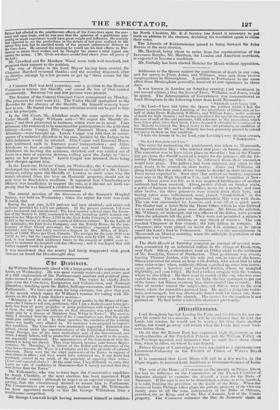Addresses to the Queen against the punishment of death in
any case, and, for mercy to Frost, Jones, and Williams, were sent from twelve congregations in Birmingham. A petition to Parliament to the same effect from Birmiagham generally, received 21,000 signatures in three days.
It was known in London on Saturday evening, (and mentioned in our second edition.) that the lives of Frost, Williains, and Jmies, would be spared. The determination of Government was communicated to Lord Brougham in the following letter from Lord Normanby
e wbeeben, 1st February 1940. " My Lord—I have laid before the Queen the petition winch I had the honour to receive from your Lordship, of the inhabitants of Gloucester, in behalf of John Frost, Zephaniah 'Williams, and William Jones, under sentence of death for hi,„wh treason ; and having considered the special circumstances of the case of each of the said prisoners, with reference to the proceedings which have mites piece since their trials, I have deemed it advisable to recominend to her Majesty to extend the Royal merry to the said prisoners, on condition of transportation for life; and her Majesty has been graciously pleased to extend her mercy to them on that condition.
" I have the honour to be, my Lord, your Lordship's very obedient servant, " N onsissnr.
" The Lord Brougham and Vans."
The order for cotnmuting the pnnishment, was taken to Monmouth, by Superintendent May ; who reached that piece on Sunday afternoon. The execution was to have taken place on Saturday ; but on the Thursday previous, the 'Sheriff received a respite for Cue prisoners till the following Thursday ; on which day, Ile informed them, their execution would take place. The gallows had been enlarged, and taken to the gaol, ready to be erected on short notice. Jones and Williams, all along hoped that the point of law would be decided in their favour, but Frost never expected. it. Soon after May arrived on Sunday, expresses were sent to the High Sheriff at Usk, and Colonel Considine at Newport. Great alarm was felt, as it was supposed intelligence of another outbreak had been received. About„twelve o'clock on Sunday night, a party of Lancers were in their saddles, ready for a march; and soon after twelve, the three prisoners were roused from their beds, and having taken some refreshment, were placed, " band-bolted," in the prisoners' van. The Gaoler and Superintendent May went with them. The van was surrounded by Lancers, and went off at a quick pace. The Gaoler had a letter from the Home Office, which he was directed not to read until he bad gone some distance. Mr. Owen, the solicitor, Mr. Whitney, an innkeeper, and two officers of the Ithles, were present when the prisoners left the gaol. They were not permitted a minute's interview with wives, children, or any friend or relative. The van reached Chepstow at four o'clock ; the rain falling in torrents. At Chepstow, they were placed on board the Usk steamer, to be taken round the Land's End to Portsmouth. Great was the astonishment in Monmouth on Monday morning, when the midnight deportation of the prisoners was known.
The Bath Herald of Saturday contains an account of several murders, committed by an infuriated ruffian in the village of Dunkerton, near Bath. Silcox, a shoemaker, went on Friday night to the residence of Mr. Banifylde, Rector of Dunkerton. That gentleman was absent, leaving Thomas Jordan, with his wife and son, in care of the, house. Silcox conversed for about an hour with Jordan, who asked him to take seine eider-wine; when, suddenly, Silcox snatched up seine iron instrument, probably a hatchet, and attached Jordan, whom he mangled frightfully, and soon killed. He had a virulent struggle with the woman, whom he 11160 killed. He then went in search of the son, who was concealed in the study : as there was no light. the boy managed to get out attic house ; but Silcox overtook him, and wounded him severely. His cries of murder roused the neighbours, and Sileox went to his owu house, where the constables pursued him. Ile made a desperate resistance, and escaped; but was afterwards found with his throat cut, floating in some water near the church. His nun lye for the murders is not guessed at. Ile had home a tolerable character previously.


























 Previous page
Previous page